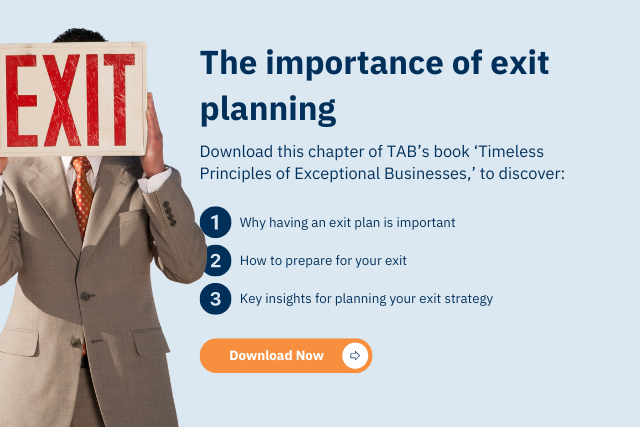
Exit Planning Strategies: How to Plan Yours 2024
by Tara Covell
Listen to Audio Version:
At some point, every business owner will have to say goodbye to their business. But how can you ensure that you part ways on the best possible terms?

Whether you're just starting out or have been running your business for a decade, it's important to have a clear idea of how you want to exit in the future. Adding value to your business is a key goal as a business owner, as it will ultimately determine the price and terms you receive when you sell.
We have created a comprehensive guide to help you plan your business exit strategy and ensure a smooth transition.
What is a Business Exit Strategy?
A business exit strategy is a well-thought-out blueprint devised by entrepreneurs to sell their ownership in a company to potential investors or even another company.
This strategic plan offers a pathway for business owners to reduce or liquidate their stake and presents an opportunity to reap substantial profits if the business thrives. Conversely, if the company doesn't meet expectations, an exit strategy, also known as an "exit plan," allows entrepreneurs to minimise their losses.
Additionally, investors like venture capitalists can utilise an exit strategy to meticulously plan their cash-out regarding their investments.
Key points to remember
- A business exit strategy is a carefully designed plan owners create to sell their company or shares to potential investors or other firms.
- Common exit strategies include initial public offerings (IPOs), strategic acquisitions, and management buyouts.
- An exit strategy allows business owners to reduce their stake or completely exit the business while making a profit if it succeeds.
- In cases where the business is struggling, implementing an exit strategy or "exit plan" enables entrepreneurs to minimise their losses.
Understanding Business Exit Strategy
A well-crafted exit strategy is crucial to any entrepreneur's initial business plan. It influences important decisions in business development and sets the stage for a successful transition when the time comes.
Entrepreneurs have exit options, such as initial public offerings (IPOs), strategic acquisitions, and management buyouts (MBOs). The choice of exit strategy depends on several factors, including the level of control and involvement the entrepreneur desires to retain in the business, their vision for the company's future after their departure, and the financial rewards they seek.
For instance, a strategic acquisition can relieve the founder of ownership responsibilities but entails relinquishing control. On the other hand, IPOs are often viewed as the ultimate achievement in exit strategies, bringing both prestige and substantial financial gains. Conversely, bankruptcy is widely regarded as the least favourable way to exit a business.
An essential aspect of any exit strategy is thoroughly evaluating the business's value. Business owners and potential buyers can seek the expertise of specialists who analyse the company's financials to determine a fair valuation. Transition managers also play a vital role in assisting sellers with business exit strategies, facilitating a smooth and successful transition.
[Read three life-changing stories of business exits from our members]

Which is the best Business Exit Strategy?
The best way to exit a business depends on the company's size and industry. For instance, if you are a partner in a medical facility, it might be beneficial to sell your share to one of your existing partners.
On the other hand, if you are a sole owner, your ideal exit strategy might involve maximising profits and eventually closing the business.
It's important to consider the opinions of other founders or significant shareholders, if any because their input should be considered when deciding on the best exit strategy.
Preparing your business for an exit strategy
In order to ensure a seamless and prosperous exit strategy, it is crucial to prepare your business proactively. This involves meticulously documenting essential information about your business, including financial statements, contracts, employee details, and legal documents.
Additionally, it's important to compile a list of potential buyers or interested parties and enlist the guidance of a qualified legal and financial team who can expertly navigate you through the entire process. It is imperative to continue running your business more efficiently and effectively during this period.
Timing your exit
Timing plays a pivotal role in the success of your exit strategy. It is crucial to determine the ideal moment to bid farewell to your business, whether it's an immediate departure, a short-term plan, or a long-term transition. Additionally, you must carefully consider the value of your business and how it may evolve over time.
As a business owner, it is essential to stay informed about market trends and changes that could impact the value of your business. According to experts, selling a business can take up to a year, so it is important to keep this timeframe in mind.
Ensuring that you exit your business at the right time and stay aware of market conditions will contribute to a successful transition and maximise the benefits you receive from your company.
...
Ultimately, creating an exit strategy for your small to medium-sized business is indispensable for facilitating a smooth transition and maximising the value of your business. It provides a definitive roadmap outlining how you will exit your business and the necessary steps to ensure a successful transition. Begin planning your exit strategy today to secure the maximum benefits from your company.
If you need constructive and actionable advice for your business, The Alternative Board's community, experienced facilitators, and peer boards are here to offer support and share their knowledge. Contact us today for a chat.
Get in touch
Connect with us and discover how we can help you.
Related articles

The ultimate guide to exit planning for business owners
Business owners should always think about exit planning. This is the ultimate guide to start thinking about how you might exit.

Succession Planning: The Importance and Benefits
Learn all about succession in this comprehensive guide to succession planning, including the importance and benefits to ensuring a smooth transition.

Strategic Planning Made Easy: A Blueprint for Success
Drive your business forward with a strategic planning day. Discover the importance of setting clear objectives, SWOT analysis, and creating actions.






